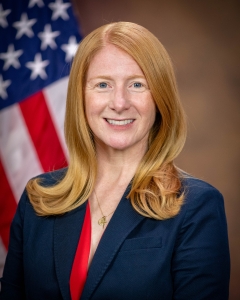
Meghan Tokash
Meghan Tokash joined the Justice Management Division as the Director of the Sexual Misconduct Response Unit in 2024 after two decades of work as an active-duty military and Department prosecutor centered on special victim crimes and trauma-informed methods of victim engagement. As one of the twelve commissioners on the Department of Defense Independent Review Commission on Sexual Assault in the Military, she contributed to the historic recommendation that became law, to shift responsibility from military commanders to military prosecutors for sexual assaults and related crimes and to create an independent and specialized prosecutorial office on par with the DOJ. In addition to her work shaping and changing legislation for victims of interpersonal crimes, Ms. Tokash continues to advise the Secretary of Defense and Pentagon senior leadership in her role as a member of the Defense Advisory Committee on the Investigation, Prosecution, and Defense of Sexual Assault in the Armed Forces. Prior to this, Ms. Tokash worked for nine years in the Department as an Assistant United States Attorney and supervisor of her District’s Special Victim Unit and most recently as a trial attorney in the Human Trafficking Prosecution Unit where she investigated and prosecuted cases involving interpersonal violence, sexual assault on federal lands, crimes against children, and human trafficking using victim-centered and trauma-informed best practices. Ms. Tokash began her career as a Special Victim Prosecutor in the United States Army Judge Advocate General’s Corp, litigating cases related to homicide, rape, sexual assault, domestic violence, and stalking. She deployed to Iraq as the senior trial counsel for U.S. Forces Iraq and to Afghanistan as the Special Victim Prosecutor for U.S. Army Central Command. As an instructor, Ms. Tokash has taught the techniques and principles of trauma-informed interviewing, offender-focused prosecutions, multidisciplinary case collaborations, and the impact of trauma on memory for international prosecutorial and law enforcement offices, U.S. Attorney’s Offices, federal law enforcement agencies, law schools, victim services agencies, and non-governmental organizations who support victims of crime.

 U.S. Department
of Justice
U.S. Department
of Justice